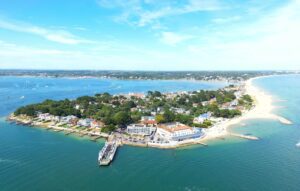
Sandbanks, long considered Britain’s most exclusive coastal enclave, is facing a sharp slowdown in demand as punitive tax changes under both the Conservative and Labour governments send high-net-worth buyers fleeing to tax-friendlier destinations abroad.
The Dorset peninsula, which once topped global lists alongside Monaco and Palm Beach, is experiencing a marked dip in buyer interest – with properties stagnating on the market and developers pulling out, experts warn.
According to new analysis and agent testimony, local demand has plummeted since April, when local authorities gained powers to double council tax on second homes. The move was introduced under the 2023 Levelling Up and Regeneration Act by the previous Conservative government but has been backed and implemented by Keir Starmer’s administration. The Liberal Democrat-run Bournemouth, Christchurch and Poole Council, which oversees Sandbanks, is one of more than 200 to adopt the hike.
Lola May Massingham, CEO of Prime Coastal Property, said demand has fallen noticeably. “There’s a lot of property on the market and not enough buyers. Labour’s double rates are really not helping,” she said. “Buyers are nervous. There’s no good news coming from the government, so people are holding off — or looking to places like Dubai and Portugal instead.”
Average house prices in Sandbanks, where waterfront homes can fetch up to £8 million, are now down 3% compared with two years ago, according to a recent Lloyds report. The area, previously buoyed by the post-pandemic rush for second homes, is now struggling to maintain its elite cachet.
At the same time, Stamp Duty on second homes has soared to 17% for high-end properties — with an extra 2% surcharge for non-residents. In combination, these policies are pushing domestic and international buyers abroad.
Developer Richard Carr, who last year sold a Sandbanks plot for a record-breaking £16 million, has since closed his development business Fortitudo. “You just can’t sell anything without heavily discounting,” he said. “Labour’s double council tax rates have evaporated the second-home market. There’s no confidence, no light at the end of the tunnel. It was bad enough under the Conservatives — now it’s ridiculous.”
Poundland-style price cuts have become common. One four-bedroom home, two minutes from the beach, was recently reduced by £100,000 — now listed at £1.75 million.
The pandemic created a boom in UK second-home demand as wealthy buyers turned to domestic retreats. But as travel restrictions eased and global uncertainty remains, buyers are retreating – or diversifying abroad.
“During Covid we couldn’t imagine getting on a plane,” said property expert Jonathan Rolande. “But the rush is over. Why spend millions to chance bad weather in England when you can get more value — and sun — elsewhere?”
He warned that even ultra-luxury properties are no longer immune to broader market pressures, adding that high Stamp Duty rates – sometimes £300,000 or more – are deterring would-be investors.
“If it’s not selling in the height of summer, it’s only going to get worse in winter,” Rolande said. “We need interest rates to drop – you can’t have a strong property market in a weak economy.”
New tax rules mean councils can now impose a 100% premium on council tax bills for second homes. In Bournemouth, Christchurch and Poole, this affects over 4,900 second homes — including 158 in Band H, the highest value bracket.
Some owners may convert properties into furnished holiday lets, which are exempt if rented out for at least 20 weeks a year. But with bookings uncertain, many see this as a risky bet.
A spokesperson for the Ministry of Housing, Communities and Local Government said the change reflects a wider effort to tackle housing shortages in coastal areas:
“Having too many second homes in an area can exacerbate the housing crisis by driving up costs for local people. Councils can now act to protect their communities.”
Despite the gloom, some agents remain cautiously optimistic. “Although the market is not as strong, I’m positive things will pick up,” Massingham said.
But others point to a deeper structural shift. “This should be prime time,” said Rolande, “but it’s not. Price cuts are coming, and unless interest rates fall, a tough winter lies ahead.”
Read more:
Sandbanks bubble bursts as buyers flee Labour’s ‘tax bombs’ for sunnier shores

